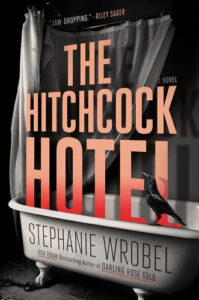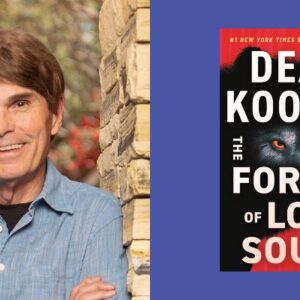In the foreword to Stephen King’s short story “1408” from his collection Everything’s Eventual: 14 Dark Tales, King writes, “Hotel rooms are just naturally creepy places, don’t you think? I mean, how many people have slept in that bed before you? How many of them were sick? How many were losing their minds?” Beyond the individual rooms themselves, think about the number of nooks and crannies inside of a hotel. On one hand, hotels are expansive—a killer could hide anywhere, moving from room to room undetected. But hotels are also claustrophobic. An unwitting guest could find herself trapped in a closet, locked in a bathroom.
There’s something eerie, too, about sleeping in such close proximity to strangers. Hearing their snores, shouts, and moans on the other side of the wall. Hoping no one will beat down your door in the middle of the night while you lie in your most vulnerable state, unconscious and dreaming. Perhaps this is why hotels and their offshoots—motels, resorts, cabins—are so frequently employed by authors. The potential for mayhem is endless.
My new book is a reunion thriller, telling the story of six former college friends who haven’t spoken in sixteen years, for reasons unknown. When I decided to set the novel in a hotel, I knew right away that the property would be Hitchcock-themed. After all, Psycho is my favorite hotel movie, and I wanted to pay homage to both that film and its director. The research that followed included a deep dive into Hitchcock’s films, as well as the hotel-based thrillers that came before mine. The novels below all make exceptional use of a setting at once foreign and familiar. These stories remind us that sometimes there really is no place like home.
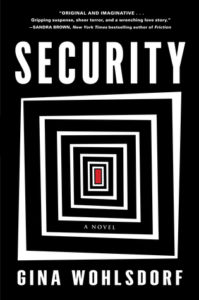
Security by Gina Wohlsdorf
Since reading Security four years ago, I have made it my mission to spread the word far and wide about its greatness. The setting is the brand spanking new Manderley Resort in Santa Barbara. The landscaper describes the modern monolith as “a tooth somebody yanked out and stuck on the beach.” The novel’s brilliance lies in its first-person-slash-omniscient point of view—thanks to security cameras placed all over the property—not to mention the humor, plot turns, and unholy terror. Seriously, I had to stop reading the book at night because it was giving me nightmares.

The Cabin at the End of the World by Paul Tremblay
I admit that with this selection, I’m stretching the definition of hotel, but if you’ve yet to read Cabin, I promise you’ll thank me later. Seven-year-old Wen and her parents, Andrew and Eric, rent a cabin in a remote part of New Hampshire. One afternoon a giant man shows up in the yard and befriends Wen. With him come three additional strangers, all carrying terrifying, unusual weapons and insisting they need the family’s help in order to save the world. I highly recommend reading this book in one sitting. Don’t forget to breathe.
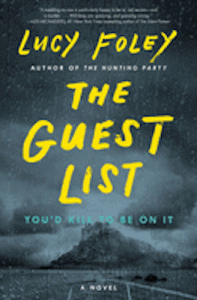
The Guest List by Lucy Foley
One of my chief concerns as I set out to write my new novel was differentiating the narrators in readers’ minds. (The Hitchcock Hotel has seven points of view.) The Guest List proved to be a superb teacher in this regard. The story is about a murder that takes place during a wedding at The Folly, a resort off the coast of Ireland. Foley cleverly utilizes traditional wedding roles to help readers keep her characters straight—the bride, the groom, the plus one, the best man, the bridesmaid, and the wedding planner. We don’t find out the identities of the victim and killer until the end of the book, and I’m not too proud to confess that despite my professional expertise, at no point did I guess whodunit. If you’ve found yourself in a reading slump lately, this book will pull you out of it.
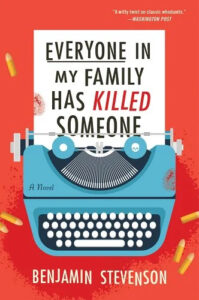
Everyone in My Family Has Killed Someone by Benjamin Stevenson
Who says murder can’t be funny? If you prefer a dose of lightheartedness with your crime, look no further than Everyone in My Family Has Killed Someone. The Cunningham family gathers for a reunion at an Australian ski resort, waiting for one of their own to be released from prison for murder. Our plucky narrator, Ernest, works to untangle crimes of past and present as the bodies pile up. I loved the breaking of the fourth wall, the snappy commentary on the mystery genre, and the puzzle-box setup of Stevenson’s inventive novel.

Please See Us by Caitlin Mullen
Mullen’s debut features one (pivotal) scene inside the Sunset Motel, but the real story is in the marshlands behind the inn. Two Jane Does have been deserted there, with more soon to follow. Only one person knows the missing women’s whereabouts—but not for long, as a young boardwalk psychic and ex-art gallery girl stick their noses where they’re decidedly unwanted. Set in Atlantic City, the sense of place in Please See Us is palpable. Once-glittering hotels are now past their prime; the same could be said of the residents. What I appreciate most about this novel, though, is the way it centers the story’s victims. Each Jane Doe gets a voice from beyond the grave, and we seethe with injustice at these lives cut short. In the end, we’ll never learn the identity of the women’s killer, but his name is beside the point. With heart and intelligence in spades, Mullen brings to life a different—and much needed—hotel thriller.
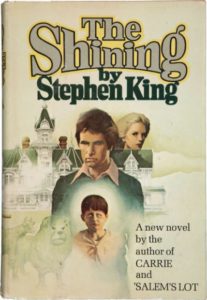
The Shining by Stephen King
My final pick is perhaps the most expected entrant, but you simply can’t write this roundup without mention of The Shining—the quintessential thriller set in a hotel. King’s fictitious Overlook Hotel is based on the real life Stanley Hotel in Estes Park, Colorado, where he and his wife once stayed during the off-season in 1973. As King tells it, they were the lone guests in the place, and their experience inside room 217 so unnerved him that he wrote a book about it. Late in my own novel, protagonist Alfred Smettle cites the Stanley as his inspiration for the Hitchcock Hotel. “Guess what the most requested room is fifty-one years after King’s stay,” Alfred says to his housekeeper, hoping to replicate the same chilling buzz for his own hotel. Does he succeed? You’ll have to read the book to find out.
***


